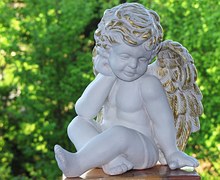
Info From Patterson Bray About the Wrongful Death of a Child
No one should have to ever think about the wrongful death of a child. As a mother of two young children, I can’t think of anything more unbearable than the loss of a child. But according to the American Association for Marriage and Family Therapy, over 57,000 children under the age of 19 die every year in the United States.
Our law firm represents parents who have lost a child due to the fault of another person or company. The legal term for a death caused by someone else’s negligence or wrongdoing is “wrongful death.”
Who can File Suit for Wrongful Death of a Child?
In Tennessee, only certain people have the right to file a lawsuit to recover damages for the wrongful death of a child. As a general matter, the child’s parents can file suit against the responsible party. If the parents are divorced, special rules apply. Usually, the parent with “primary custody” has the right to file suit. An administrator can also file the lawsuit. Tenn. Code Ann. Section Tennessee Code Annotated Section 20-5-106 provides that the wrongful death cause of action:
shall pass to . . .the [child’s] natural parents or parent or next of kin if at the time of death [the child] was in the custody of the natural parents or parent and had not been legally surrendered or abandoned by [the parents] pursuant to any court order removing [the child] from the custody of [the parents or parent]; or otherwise to the [child’s] legally adoptive parents or parent, or to the administrator for the use and benefit of the adoptive parents or parent; the funds recovered in either case to be free from the claims of creditors.
Occasionally, due to family circumstances, wrongful death cases involving children can become very complicated. Sometimes disputes arise between divorced parents or among family members as to how the case should be handled. Also, even if you aren’t the person to file the lawsuit, you may still be entitled to recover a portion of the damages awarded. Likewise, the person who files the lawsuit may or may not be entitled to a portion of the money damages awarded. An experienced wrongful death attorney can talk with you, learn about your family situation, and advise you on your potential rights.
What are the Damages in a Wrongful Death Case Involving a Child?
Damages in a case involving the wrongful death of a child are determined on a case by case basis. A jury will look at all of the facts and circumstances and make an award. Legally speaking though, the types of damages recoverable in a wrongful death case are statutory and are set forth in Tennessee Code Annotated Section 20-5-113. The general categories are:
(1) Injuries Suffered by the Child from Time of Injury Until Death
This classification allows recovery for medical expenses, physical and mental pain and suffering, funeral expenses, and loss of earning capacity during the period from injury to death.
(2) Incidental Damages Sustained by Child’s Next of Kin
This classification of damages includes the pecuniary value of the child’s life. The “pecuniary value” of a deceased child’s life represents the value of the child’s probable future financial accumulations at the time of the child’s death. To determine the pecuniary value of a decedent’s life, a court considers the following factors: life expectancy and age, condition of health, capacity for earning money through a skill, art, trade, profession, occupation or business, and personal habits regarding sobriety and industry. The amount should then be reduced by deducting the decedent’s probable living expenses had the decedent lived.
In the case of a wrongful death of a child, the analysis is a bit different. Living expenses are the costs associated with child-rearing. In the case of a very young child, estimates of the child’s future earnings and contributions are speculative at best. For this reason, it can be helpful to have expert testimony concerning the valuation of a child’s pecuniary losses.
Loss of Consortium (Filial Consortium Damages)
Pecuniary value also includes the value of human companionship. Parents of a deceased child are entitled to recover for loss of consortium. However, these claims for loss of consortium cannot exist independently from the claim that a defendant’s negligence caused the child’s death. Thus, parents cannot recover for the sorrow and anguish endured as a result of the child’s death. Rather, the “pecuniary value” of the child’s life includes a value for the parents’ loss of consortium
In determining the amount of consortium damages, courts consider the benefits the child bestowed on the family, such as companionship, comfort, society, attention, cooperation, affection, care and love. Because it is impossible to generalize on the extent to which family members enjoy each other’s companionship and society, the measurement of a particular parent’s loss of a particular child’s consortium is decided on a case by case basis.
Punitive Damages
If the child’s death was caused by reckless or intentional conduct, parents can seek punitive damages. Punitive damages are designed to punish the responsible person and deter similar behavior.
Negligent Infliction of Emotional Distress
Depending on the facts of the case, parents of a deceased child may be able to assert independent claims for “negligent infliction of emotional distress.” An experienced wrongful death lawyer can advise you further about this and other claims you may have.
Limits on Damages in Tennessee Due to Tort Reform
As a general rule, the most that parents can recover for “loss of consortium” damages for the wrongful death of a child is $750,000. Punitive damages are usually limited to $500,000 or two times the compensatory damages, whichever is greater. One of our Memphis wrongful death attorneys can discuss your case and explain the rules on damages in Tennessee, as well as the various limitations in effect due to Tennessee Tort Reform.
Looking for a Caring and Compassionate Wrongful Death Lawyer?
If you’d like to speak with a caring and compassionate wrongful death lawyer in the Memphis or Nashville area, please call our office at 901-372-5003. We’re not your everyday law firm. We are mothers and fathers just like you and we treat our clients like family. There is never any charge for an initial consultation or meeting.
 UPDATED on 08/08/2016: Police have now identified the victim as Monique Brown, who is the mother of a young child.
UPDATED on 08/08/2016: Police have now identified the victim as Monique Brown, who is the mother of a young child.





